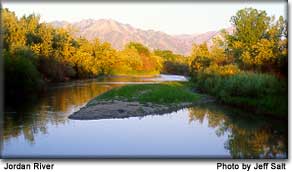 Prior to European settlement, lowland
riparian and wetland habitats along the Jordan River made it one of the
region's richest avian resources. The intrinsic value of these habitats,
coupled with the Jordan River's landscape position (connecting the
internationally important Great Salt Lake and Utah Lake, and avoiding
the high Wasatch Range and dry West Desert), made it an important
resource for breeding, wintering and migrating birds. Today, a once
natural, meandering river corridor providing abundant fish and wildlife
habitat has been compromised by human development. Prior to European settlement, lowland
riparian and wetland habitats along the Jordan River made it one of the
region's richest avian resources. The intrinsic value of these habitats,
coupled with the Jordan River's landscape position (connecting the
internationally important Great Salt Lake and Utah Lake, and avoiding
the high Wasatch Range and dry West Desert), made it an important
resource for breeding, wintering and migrating birds. Today, a once
natural, meandering river corridor providing abundant fish and wildlife
habitat has been compromised by human development.
To help address this problem, open space areas with natural values along
the Jordan River, which include areas acquired by the Commission as wetlands
mitigation, have been designated
the Jordan River Natural Conservation Corridor. These areas are not contiguous
the length of the river, but provide habitat for riparian species and
require similar management goals and objectives. The Commission helped
develop a report, the Jordan River
Natural Conservation Corridor Report that identifies these existing
and potential areas, as well as management recommendations.
In 2001, the Jordan River Natural Areas Forum (JORNAF)
was created to implement Report
recommendations. In October 2002, twenty-eight forum members, including city,
state, local and
federal entities and private and non-profit organizations, signed a Memorandum
of Understanding to work together to preserve and restore
the corridor.
JORNAF is
being
coordinated
by
the Governor's Office of Planning and Budget. [Click here to link to their website].
The Commission has concluded its program for wetlands
acquisition along the Jordan River corridor and is focusing
on restoring the natural areas on three projects underway
on Commission-owned or partially-owned lands. The Commission
is also limiting
its planning efforts to those related to the project
areas.
In, September 2018, the Mitigation Commission and West Jordan City prepared a final Environmental Assessment and decision for creating riparian, riverine, wetland and upland habitat along the Jordan River at approximately 8600 South in West Jordan. The following provide information about this decision and its environmental impacts:
The Commission has been working with the Trust for Public
Lands, Utah
Department of Transportation, U.S. Fish and Wildlife Service, Great Salt Lake Audubon, Tree
Utah, and Salt Lake County to restore Commission-acquired properties. Please
refer
to our Annual
Report and Mitigation and Conservation Plan (see "Jordan River Watershed")
for descriptions of project areas, agreements and locations of these properties.
|